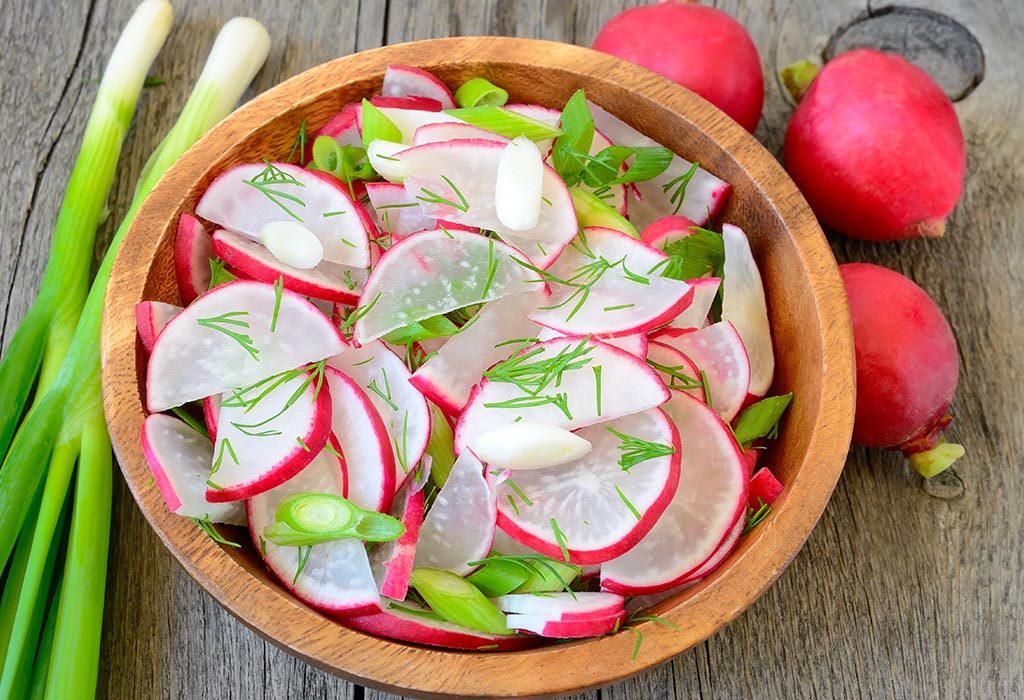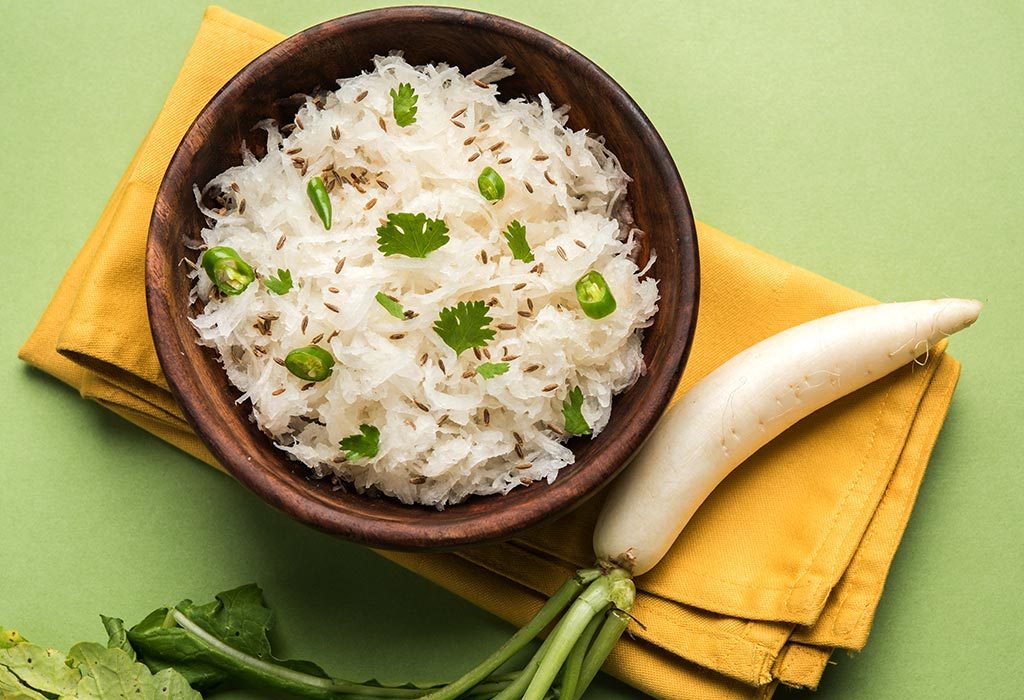In this Article
Radish is a common and delicious part of Indian cuisine. It can appear in many colours, although the most common one is white. They even come in various shapes, both short and round, as well as long and tapered. Radish can be consumed raw, cooked, fried or baked. However, during pregnancy, it pays to keep a close eye on the foods you are eating.
Can Pregnant Women Eat Radish?
Many food items are risky or unsafe to consume during pregnancy. While you may not have been suspicious of radishes before, now is the time to do so. The dangers associated with eating white radish during pregnancy, however, are indirect. So, the short answer is yes; you can eat them, but only after following certain precautions listed in this article.
Nutritional Value of Radish
A single cup of radish will provide you with a host of important vitamins and minerals, from potassium, folate, calcium, iron, Vitamin C, Vitamin A, B-Vitamins, zinc and manganese. Folate is especially crucial for the healthy development of your baby, while Vitamin C and iron are important in the development of the circulatory system and various organs. Further, calcium is essential for the development of the teeth, skeletal system and muscles.
Amazing Benefits of Eating Radish During Pregnancy

There are several health benefits of making radish a part of your regular diet. Some of them are:
1. Weight Control
Radishes fill you up easily, managing your hunger while reducing your calorie intake. Additionally, they are low in carbohydrates and sugar while having high amounts of dietary fibre, which can ease constipation.
2. Cancer Prevention
Several powerful anti-carcinogens such as isothiocyanate and sulforaphane are known to be present in radish.
3. Optimises Cardiovascular Health
The abundance of potassium in radishes have been known to reduce blood pressure by improving the circulation of blood. Antioxidants named anthocyanins can also help lower the risk of cardiovascular diseases.
4. Improves Urinary Problems
The diuretic properties of radishes improve the flow of urine. The anti-inflammatory properties help treat urinary tract swellings, infections, and so on.
5. Diabetes
Radishes have a low glycemic index, which means it does not affect the levels of glucose in the blood. This is quite important for people with diabetes who need to pay attention to their diet constantly.
6. Skin Conditions
Vitamin C, B-Vitamins and Zinc are excellent for skin healing and production. These nutrients improve the efficiency of certain enzymes used in the synthesis and development of collagen, the protein structure that holds skin cells together.
7. Immunity
Radishes boost immune cell production in your body, as well as your baby’s, due to the presence of Vitamin C. In fact, a cup of cooked radish would provide you thirty per cent of your daily requirement of the vitamin.
Safety Measures to Follow While Eating Radish
As mentioned, while radishes are a phenomenal addition to a balanced diet, there are several precautionary measures to follow before consuming them:
- Washing radishes and radish sprouts thoroughly to remove dirt is the first step to avoid infections. This is because radishes are root vegetables and are often sold caked in mud and grime. If necessary, peel the radish to avoid eating the skin altogether.
- Avoid raw radish for the same reason, as cooking them first kills any harmful pathogens present.
- Please wash your cutting board with water and detergent properly after chopping radishes before using it for other vegetables.
- Always wash your hands before preparing food for yourself, especially radishes and other underground vegetables like carrots, turnips, potatoes and beetroots.
Risks and Consequences of Eating Radish When Pregnant
As long as you follow the precautions mentioned above, there is no reason to exclude such nutritious food from your diet. However, if they are not cleaned or cooked well, you might risk a chance of dangerous infections like Salmonellosis, Toxoplasmosis and Shigellosis. These cause high fever, dehydration, body aches and other symptoms that could affect your pregnancy. If the infection is particularly severe, it could lead to premature labour, miscarriage or stillbirth.
How to Incorporate Radish in Your Pregnancy Diet

Here are a few ways to add radish to your diet:
- Use it in soups and stews with other vegetables as a delicious snack.
- Cook it along with pasta or ghee rice for some added nutrient boost.
- Radishes are commonly used in various Indian dishes including paratha, chutney, and sambar.
Pregnancy is a difficult time in a woman’s life, so it is important that you pay heed to your diet for the sake of your baby’s wellbeing as well as yours. As long as safety measures are considered and implemented, there is no reason why you shouldn’t have a successful pregnancy.









